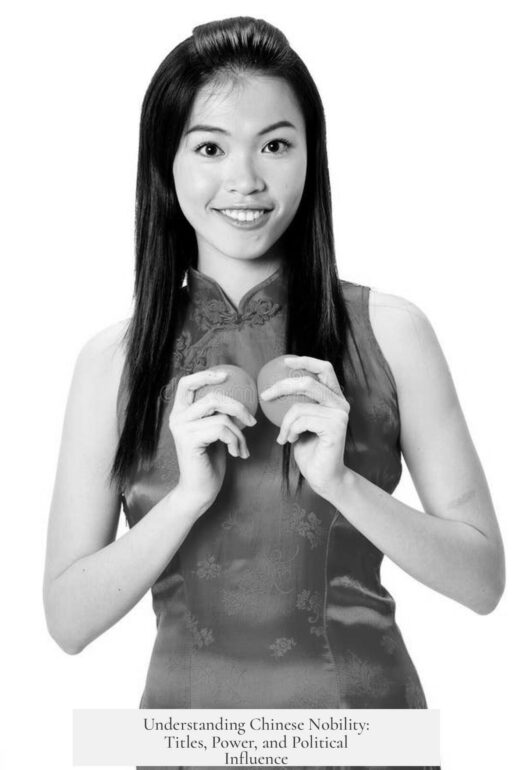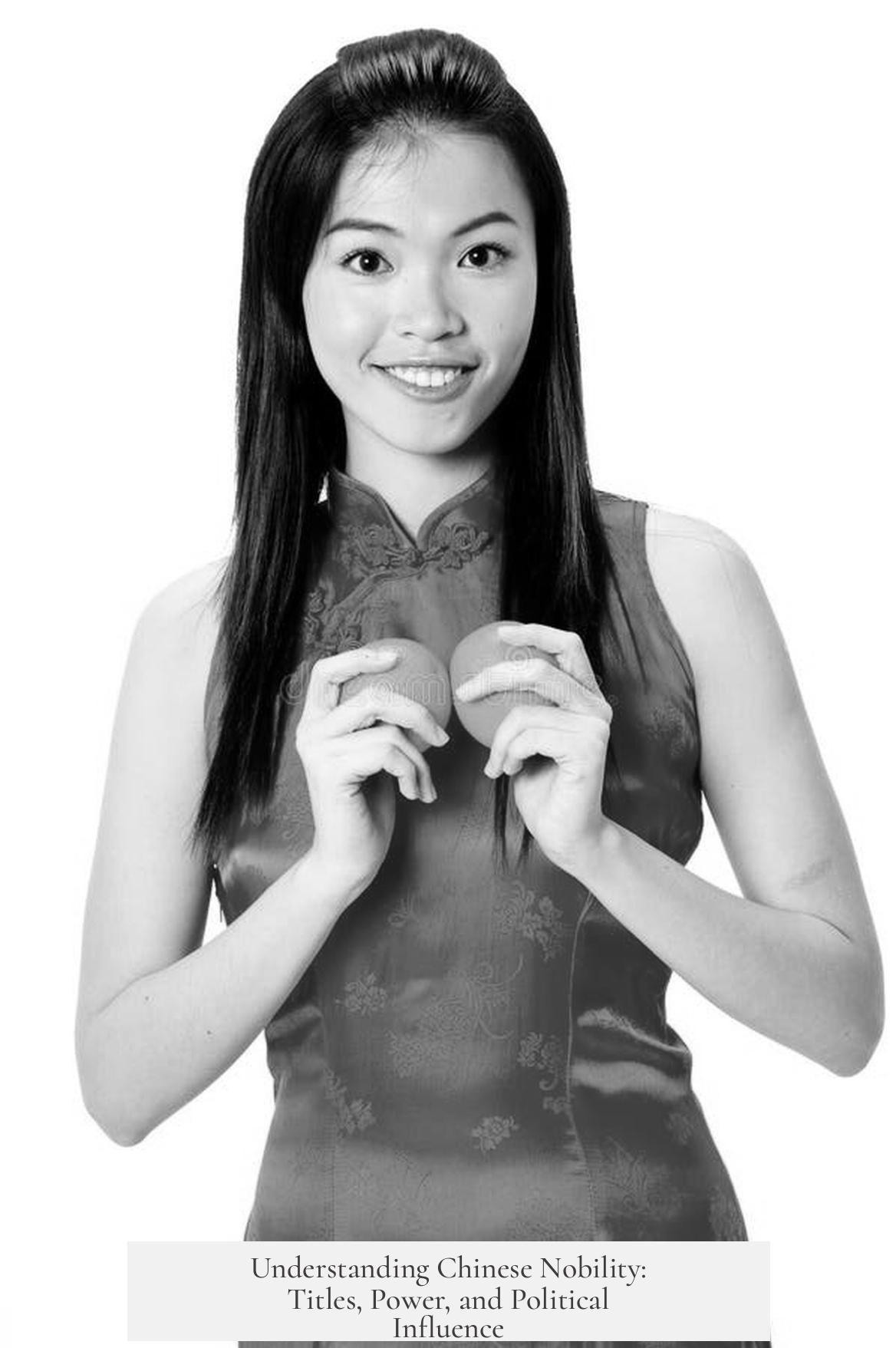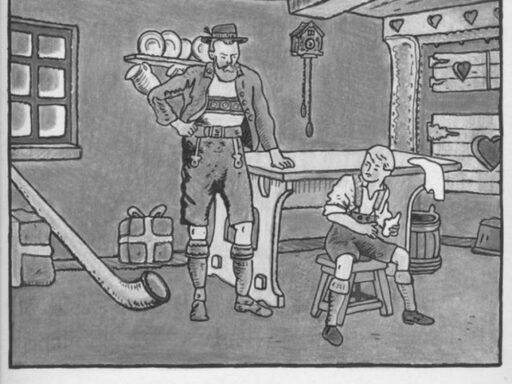Chinese nobility operated through a hierarchical system of ranks tied closely to the Zhou dynasty’s feudal tradition. The system featured specific noble titles below the king (*wang*) and prince (*wangzi*), evolved over dynasties, and included distinct rules for inheritance, political power, and the recognition of consorts and officials.
The Zhou dynasty (1046 BCE – 256 BCE) established the foundation for Chinese nobility. It arranged ranks beneath the king and prince in a strict order of prestige and landholding privileges. At the top was the duke (*gong*), typically a royal relative or a notable figure who was “adopted” into the royal fold. Dukes were often granted extensive lands within the kingdom’s heartland, reinforcing their status and power.
Below dukes stood marquises (*hou*). These nobles controlled territories on the kingdom’s fringes, akin to European march lords guarding borderlands. The next ranks included the count (*bo*), followed by the viscount (*zi*). A viscount’s title shared the same character as “master,” emphasizing their authority though ranking lower in the feudal hierarchy. The lowest noble rank was baron (*nan*), often holding minor lands or titles.
With the unification of China under Qin Shi Huang, the concept of nobility transformed. The title huangdi replaced king, consolidating supreme power under the emperor as “the sovereign above all kings and peoples.” Despite this transformation, the peerage structure persisted with titles like duke and marquis used through to the Ming dynasty (1368–1644). The Qing dynasty (1644–1912) maintained these titles but introduced complexities in inheritance rules and peerage ranks.
The system of inheritance was rigid. Titles typically passed from father to son by the main consort or wife. Children of concubines generally could not inherit noble peerages. For example, Li Yuan, founder of the Tang dynasty, held the title Duke of Tang (Tang Gong) inherited from his father. This hereditary passing linked families to power and status over generations. However, under Qing rule, peerage inheritance became more complicated. Titles could degrade over generations, shifting from duke to viscount, and some princely titles were non-perpetual, lasting only a limited number of generations.
Imperial consorts and concubines also had formal ranks and titles throughout imperial history. These rankings mattered for court protocol and politics, reflecting the emperor’s favor and the consort’s political influence indirectly.
Between the Tang and Qing dynasties, a system of courtesy and honorary titles developed alongside hereditary peerages. Titles could be granted to officials or families in recognition of exceptional service or lineage. The male head of the Confucius family, for instance, was awarded the title Duke Yangsheng during the Northern Song dynasty—an honor that still resonates with his descendants today. The Mongol Yuan dynasty conferred the title Duke of Ying (Ying Guo Gong) to the last Song emperor, exemplifying political strategy through title grants. The Ming dynasty also used its complex system to reward loyal officials with noble-style honors without necessarily linking them to hereditary landholding.
Politically, nobility experienced diminishing power from the Sui dynasty period onward. By the Sui dynasty (581–618 CE), the bureaucratic system emphasized merit over birth. Candidates for government positions had to pass examinations in literature and Confucian philosophy. This meritocratic system overshadowed hereditary privilege. Unlike European counterparts, Chinese nobles rarely wielded independent political authority; instead, they integrated into a centralized imperial bureaucracy or held ceremonial titles.
| Rank | Chinese Title | Role and Land |
|---|---|---|
| King | Wang (王) | Supreme ruler over a kingdom |
| Prince | Wangzi (王子) | Royal family member with high status |
| Duke | Gong (公) | Royal relative or adopted noble, often granted core lands |
| Marquis | Hou (侯) | Territorial lord on kingdom borders |
| Count | Bo (伯) | Mid-level noble rank |
| Viscount | Zi (子) | Lower rank, sometimes denoting “master” |
| Baron | Nan (男) | Lowest noble rank |
The Chinese nobility’s evolution reflects the broader socio-political shifts in imperial China. It transitioned from a territorial feudal model to a meritocratic state system where nobility often became honorary rather than purely political. Special titles and ranks continued to mark distinction but political power centered on imperial authority and bureaucratic meritocracy.
- The Zhou dynasty laid the basic noble rank system below king and prince.
- Titles included duke, marquis, count, viscount, and baron, with clear land and status distinctions.
- Qin Shi Huang introduced the emperor (*huangdi*), changing the supreme ruler title.
- Peerage inheritance was patriarchal and favored legitimate wives’ children.
- Political power of nobles faded due to merit-based bureaucracy from Sui dynasty onward.
- Honorary titles and courtesy ranks complemented hereditary peerages in later dynasties.
- Qing dynasty introduced title degradation and limits on inheritance.
How Did Chinese Nobility Work? A Deep Dive Into Imperial Titles and Power
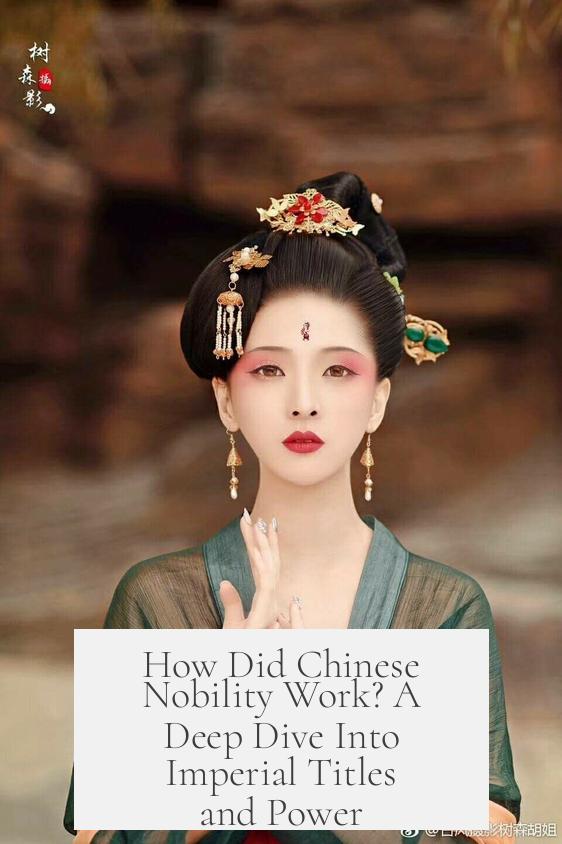
The Chinese system of nobility was a structured hierarchy grounded in familial relations, merit, and evolving political ideology. Unlike some Western feudal systems defined by rigid hereditary power alone, Chinese nobility combined bloodline, service, and an intricate blend of titles. The journey starts in the Zhou dynasty and stretches through to Qing, revealing a tapestry of ranks, inheritance customs, and political realities.
Let’s uncover how this ancient nobility worked, why it mattered, and how it shaped Imperial China’s ruling elite—all without the sweeping generalizations. Ready for a historical ride? Buckle up.
Who Were the Nobles? The Ranks and Their Meanings
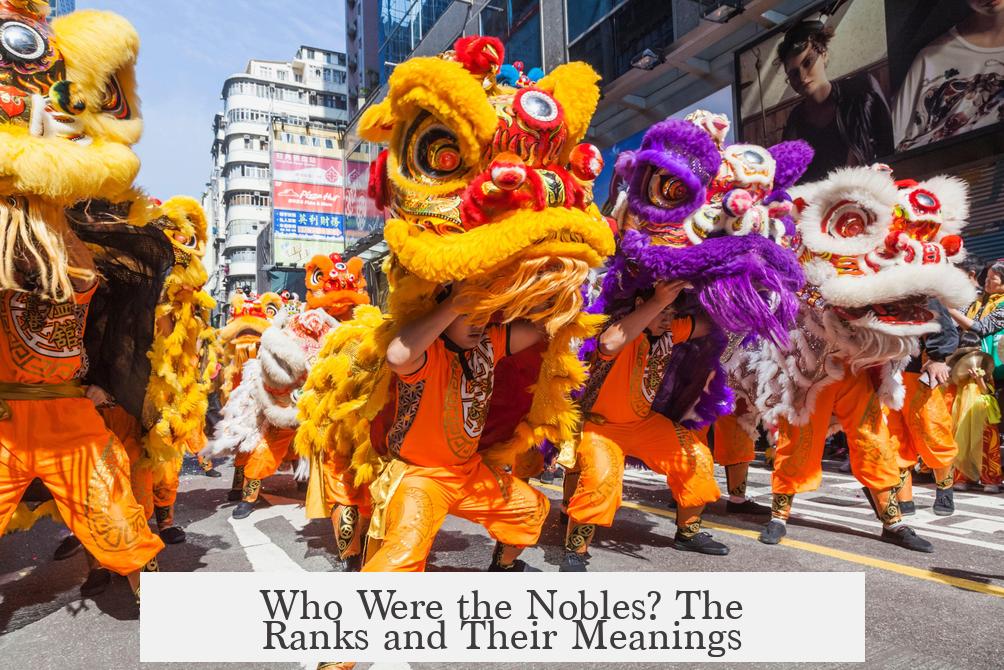
Imagine the Zhou dynasty’s nobles as a layered cake—each tier had a precise role and status, carefully baked in tradition.
- Duke (gong): The top dog of nobility below the royal king (wang) and prince (wangzi). Dukes were often relatives of the royal family or “royally adopted” due to exceptional contributions. They got prime real estate—duchies at the kingdom’s heart. How fancy is that?
- Marquis (hou): Like border guards or regional managers, marquises held territories on the kingdom’s fringes. Think European march lords with a Chinese flair.
- Count (bo): Ranked below marquises, they carried less clout but still enjoyed noble privileges.
- Viscount (zi): Besides being a rank, zi also means “master,” famously attached to Confucius as Kongzi. A noble title with wisdom vibes, anyone?
- Baron (nan): The lowest peerage rank mentioned, a modest noble but still part of the elite circle.
Some nobles were born to it; others earned it. Dukes might be born into power or adopted into the royal fold as a royal ‘thank you’ for standout service.
How Did Titles Evolve? Enter the Emperor
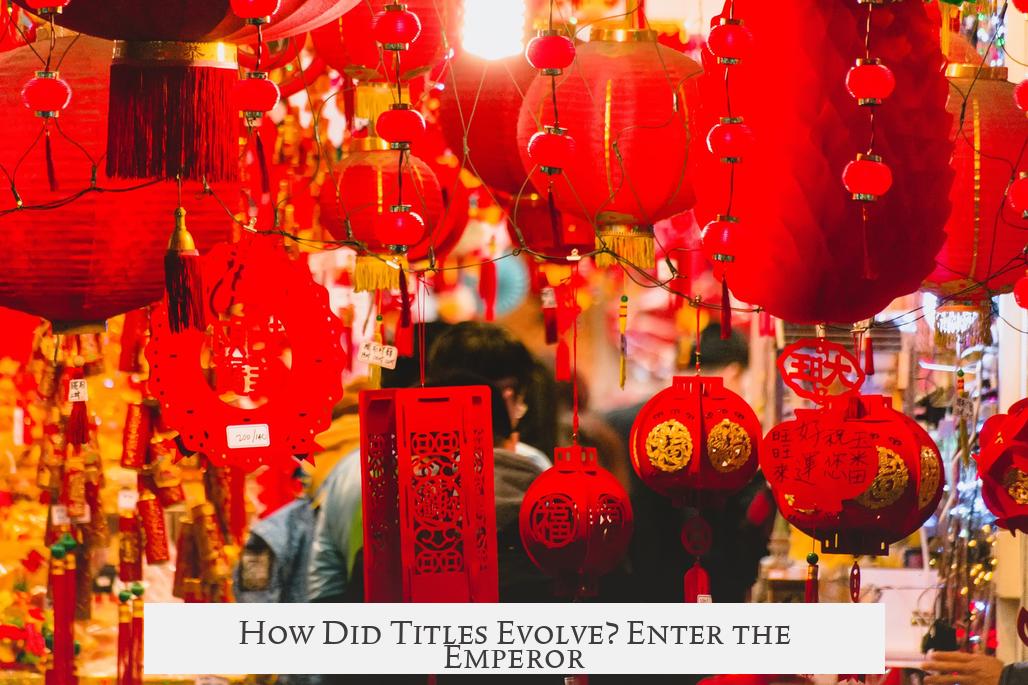
The real game-changer came with Qin Shi Huang—the first emperor of China—who coined huangdi, meaning ’emperor.’ This elevated the ruler beyond kings, placing him supreme over all other nobles. Huangdi fused the mystical and political, signaling a shift to centralized imperial power.
Despite this dramatic title, the traditional peerage system—dukes, marquises, counts, and the like—kept rolling through dynasties such as Ming and Qing with mostly minor tweaks. In Qing, the inheritance rules and peerage system became deliciously complex, introducing degradation of titles across generations, a concept alien to many Europeans.
What About Passing Down Titles? The Intricacies of Inheritance

Here’s where Chinese nobility get interestingly strict.
Primogeniture was the norm. Titles passed primarily from father to son, but not just any son—**only the son of the main wife, not concubines’ offspring**. Keep it clean and orderly. This system stabilized noble families but often sparked family drama. Imagine the poor concubines’ kids watching from the sidelines.
Take Li Yuan, founder of the Tang dynasty. Before being emperor, he was the Duke of Tang, a title his father held first. That’s a textbook example of noble inheritance keeping power within a family line.
In Qing, the inheritance game tightened further. Titles could lose rank across generations—say, Duke to Viscount—and were sometimes limited to a set number of transfers. Not guaranteed to stay grand forever.
Imperial Ladies: Titles for Consorts and Concubines
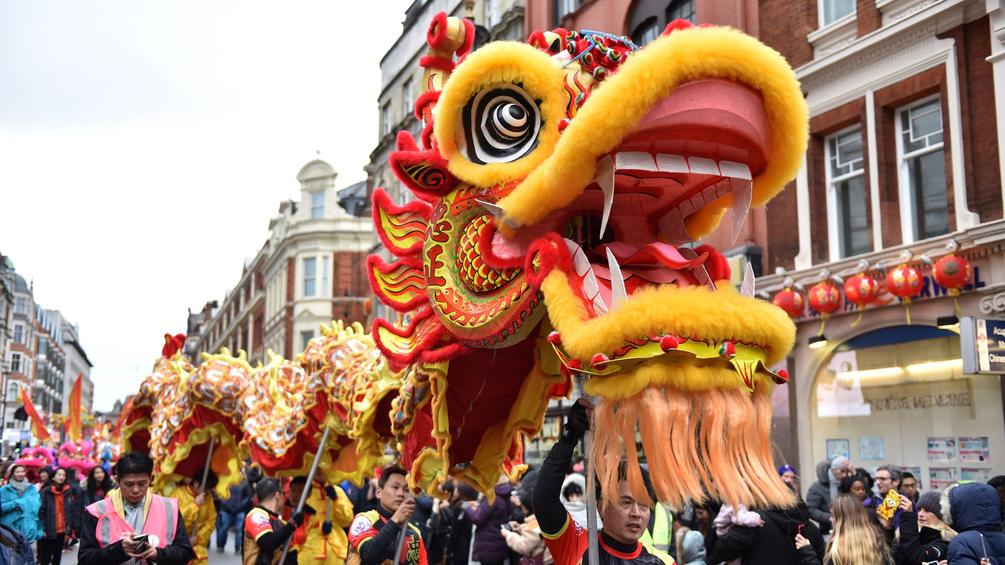
While sons got titles and power, the emperor’s consorts and concubines weren’t left out of the noble title soap opera.
Imperial China developed a ranking system just for them, granting different ranks and privileges. It was a parallel nobility wheel revolving inside the palace walls.
Honorary and Courtesy Titles: Beyond Simple Inheritance
Good deeds and loyalty earned special noble titles too.
For example, the head of the Confucius family received the title Duke Yangsheng during the Northern Song dynasty—and his descendants still carry variants today. That’s some serious ancestral street cred.
After Yuan’s conquest ended the Song dynasty, the Mongols honored the last Song emperor as Duke of Ying. Even conquerors respected noble titles enough to keep the ritual alive.
The Ming dynasty upsized the system, offering titles to officials for long and diligent service. Nobility wasn’t just birthright; merit played a starring role too.
The Political Reality: How Much Power Did Nobles Really Have?
Unlike European nobles who often wielded extensive political and military power, Chinese peers saw their influence decline fairly early on.
By the Sui dynasty, China adopted a meritocratic bureaucracy. Anyone wanting political office needed to pass tough exams and prove their grasp of Confucian philosophy. That limited the nobility’s political heft.
This shift meant Chinese nobles were often more like honored bureaucrats than warrior lords with private armies. Their hereditary titles preserved status and privilege, but real political authority generally resided in the scholar-official class—merit over bloodline.
Why Does This Matter? Lessons from Chinese Nobility
Why should we care about the inner workings of Chinese nobility? Because it highlights a fascinating balance of tradition, meritocracy, and political control—a system quite ahead of its time.
For historians or curious minds, it shows that hereditary aristocracy doesn’t always mean unlimited power. Nor is it completely divorced from merit. Chinese emperors smartly balanced both to maintain a vast, stable empire for centuries.
Modern governance debates about elitism and meritocracy might find echoes here—with lessons on stability and fairness. A noble thought, isn’t it?
Final Thoughts: The Complex Charm of Chinese Nobility
From dukes adopted into royalty to the emperor standing above kings, Chinese nobility is a layered story. It’s about family ties, political shifts, and cultural norms etched over 2,000 years.
It avoids the clichés of absolute hereditary power by adapting and morphing through dynasties—a fluid peerage system blending blood, service, and title prestige.
It challenges Western assumptions that noble titles equal political power, showing a civilization where knowledge and merit pungently shaped governance.
Next time you hear “Chinese nobility,” remember it’s not just a list of fancy titles but a nuanced social order balancing honor, inheritance, and intellect.
“Dukes, marquises, viscounts, and barons walking the corridors of Imperial power—some born royal, others forged by merit, all wedged between tradition and innovation in the sprawling tale of China’s nobility.”
Curious about the stories behind noble families or how the Qing dynasty complicated the system? Or how Confucius’ descendants still carry noble titles? History has many more fascinating nuggets waiting to be uncovered.
